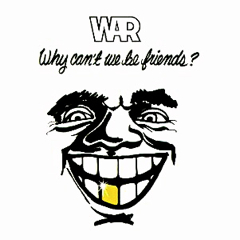
Why Can't We Be Friends? is the seventh studio album by American funk band War, released on June 16, 1975 by United Artists Records. Two singles from the album were released: the title track backed with "In Mazatlan", and "Low Rider" backed with "So". Both A-sides were nominated for the Grammy Awards of 1976.

How Ya Like Me Now is the second solo studio album by American rapper Kool Moe Dee from the Treacherous Three. It was recorded at Battery Studios in London, England and released on November 3, 1987 via Jive Records.
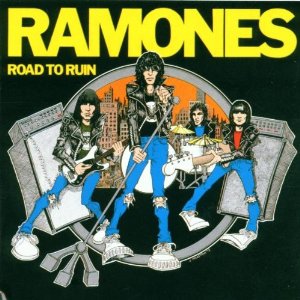
Road to Ruin is the fourth studio album by American punk rock band the Ramones, released on September 21, 1978, through Sire Records as LP record, 8 track cartridge & audio cassette. It was the first Ramones album to feature new drummer Marky Ramone, who replaced Tommy Ramone. Tommy left the band due to low sales of previous albums as well as stress he experienced while touring; however, he stayed with the band to produce the album with Ed Stasium. The artwork's concept was designed by Ramones fan Gus MacDonald and later modified by John Holmstrom to include Marky instead of Tommy. The album includes the well-known track "I Wanna Be Sedated".
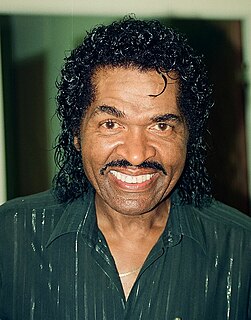
Bobby Rush is an American blues musician, composer, and singer. His style incorporates elements of blues, rap, and funk.

Modern Sounds in Country and Western Music is a studio album by American singer and pianist Ray Charles. It was recorded in February 1962 at Capitol Studios in New York City and United Western Recorders in Hollywood, and released in April of that year by ABC-Paramount Records.

Animal Boy is the ninth studio album by American punk band Ramones, released through Sire Records on May 19, 1986. Due to conflicts within the group, the album features less of lead singer Joey Ramone, both in performing and writing, and less performing from guitarist Johnny Ramone. Bassist Dee Dee Ramone wrote and sang more on this album than on previous albums, and Richie Ramone became the first drummer to write songs for the band since Tommy Ramone, the band's original drummer, Richie also wrote for Too Tough To Die (1984). The album spawned four singles, all of which charted on the UK Singles Chart, as well as other charts. In addition to singles, the band promoted their album using a music video for "Something to Believe In", which parodied the contemporary benefit concerts Live Aid and Hands Across America.
"Rockaway Beach" is a song by American punk rock band Ramones, released in 1977 from the band's third studio album Rocket to Russia. The song was written by bassist Dee Dee Ramone in the style of the Beach Boys and early surf rock bands. The song is about Rockaway Beach in Queens, where Dee Dee liked to spend time. Guitarist Johnny Ramone claimed that Dee Dee was "the only real beachgoer" in the group. Released in 1977, it was the Ramones' highest-charting single in their career, peaking at number 66 on the Billboard Hot 100.

Big Willie Style is the debut solo album by American rapper and actor Will Smith. It was released on November 25, 1997, by Columbia Records. The album was primarily produced by Poke & Tone, with other contributors including L.E.S. and Smith's former collaborator DJ Jazzy Jeff. The album was the first to be released by Smith since 1993's Code Red, the last by the duo DJ Jazzy Jeff & the Fresh Prince. Five singles were released, including Smith's first US Billboard Hot 100 number one, "Gettin' Jiggy wit It".

The World Is a Ghetto is the fifth album by the band War, released in late 1972 on United Artists Records. The album attained the number one spot on Billboard, and was Billboard magazine's Album of the Year as the best-selling album of 1973. In addition to being Billboard's #1 album of 1973, the album was ranked number 444 on Rolling Stone magazine's original list of the 500 greatest albums of all time. The title track became a gold record.
"All the Way" is a song published in 1957 by Maraville Music Corporation. The music was written by Jimmy Van Heusen with lyrics by Sammy Cahn.

All Day Music is the fourth album by funk group War, released November 1971 on United Artists Records.
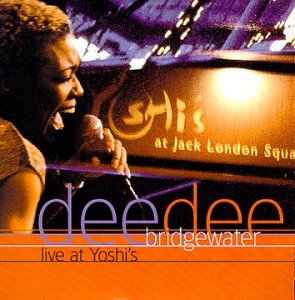
Live at Yoshi's is a 1998 live album by Dee Dee Bridgewater, recorded at Yoshi's Jazz Club in Oakland, California.

Love Is Like a Butterfly is the fourteenth solo studio album by Dolly Parton. It was released on September 16, 1974, by RCA Victor. The title track was the third consecutive single to reach #1 on the U.S. country charts for Parton. For the few years before her pop chart success, "Butterfly" was considered Parton's signature song and was used as the theme song for her 1976 syndicated music series Dolly!. The album peaked at # 7 on the country albums charts. The album was rereleased on iTunes in March 2014 the same day as her 2014 album Blue Smoke was made available for pre-order.
"There Was a Time" is a song written and performed by James Brown.

Orphans: Brawlers, Bawlers & Bastards is a limited edition three CD set by Tom Waits, released by the ANTI- label on November 17, 2006 in Europe and on November 21, 2006 in the United States.

"Mother Popcorn " is a song recorded by James Brown and released as a two-part single in 1969. A #1 R&B and #11 Pop hit, it was the highest-charting of a series of recordings inspired by the popular dance the Popcorn which Brown made that year, including "The Popcorn", "Lowdown Popcorn", and "Let a Man Come In and Do the Popcorn".

Get On the Good Foot is the 34th studio album by American funk and soul musician James Brown. It released as a double LP on November 20, 1972, by Polydor Records.

Body Meta is an album by Ornette Coleman and Prime Time.
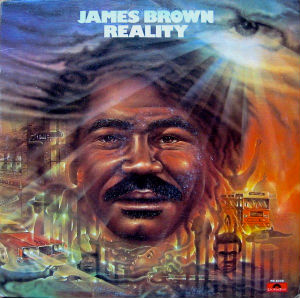
Reality is the 39th studio album by American musician James Brown. The album was released in 1974, by Polydor Records.

I'm Back is the 57th studio album by American musician James Brown. The album was released on November 17, 1998, by Mercury Records.

















